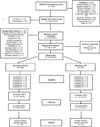Behavioral couples therapy for smoking cessation: A pilot randomized clinical trial
- PMID: 25642582
- PMCID: PMC4768739
- DOI: 10.1037/adb0000051
Behavioral couples therapy for smoking cessation: A pilot randomized clinical trial
Abstract
Behavioral couples therapy (BCT) has been found to improve long-term abstinence rates in alcohol- and substance-dependent populations but has not been tested for smoking cessation. This pilot study examined the feasibility and acceptability of BCT for smoking-discordant couples. Forty-nine smokers (smoking >10 cigarettes/day) with nonsmoking partners were randomized to receive a couples social support (BCT-S) intervention or an individually delivered, standard smoking cessation treatment (ST). The couples were married or had been cohabiting for at least 1 year, with partners who had never smoked or had not used tobacco in 1 year. Both treatments included 7 weekly sessions and 8 weeks of nicotine replacement therapy. Participants were followed for 6 months posttreatment. The Partner Interaction Questionnaire was used to measure perceived smoking-specific partner support. Participants were 67% male and 88% White. Biochemically verified cessation rates were 40.9%, 50%, and 45% in BCT-S and 59.1%, 50%, and 55% in ST at end of treatment, after 3 month, and after 6 months, respectively, and did not differ significantly between treatment conditions at any time point. Perceived smoking-specific partner support at posttreatment did not significantly differ between treatment groups. Results of this pilot study do not provide support for the efficacy of BCT in smoking-discordant couples.
(c) 2015 APA, all rights reserved).
Conflict of interest statement
Figures
References
-
- Albertsen K, Borg V, Oldenburg B. A systematic review of the impact of work environment on smoking cessation, relapse and amount smoked. Preventive Medicine. 2006;43:291–305. - PubMed
-
- Brothers BM, Borrelli B. Motivating Latino smokers to quit: Does type of social support matter? American Journal of Health Promotion. 2011;25:S96–S102. - PubMed
-
- Carroll KM, Nich C, Sifry RL, Nuro KF, Frankforter TL, Ball SA, et al. A general system for evaluating therapist adherence and competence in psychotherapy research in the addictions. Drug & Alcohol Dependence. 57(3):225–238. - PubMed
-
- Centers for Disease Control and Prevention. Current Cigarette Smoking Among Adults — United States, 2005–2012. Morbidity and Mortality Weekly Report. 2014;63:29–34. Retrieved from http://www.cdc.gov/mmwr. - PMC - PubMed
-
- Centers for Disease Control and Prevention. Smoking-attributable mortality, years of potential life lost, and productivity losses—United States, 2000–2004. Morbidity and Mortality Weekly Report. 2008;57:1226–1228. Retrieved from http://www.cdc.gov/mmwr. - PubMed
Publication types
MeSH terms
Grants and funding
LinkOut - more resources
Full Text Sources
Other Literature Sources
Medical


